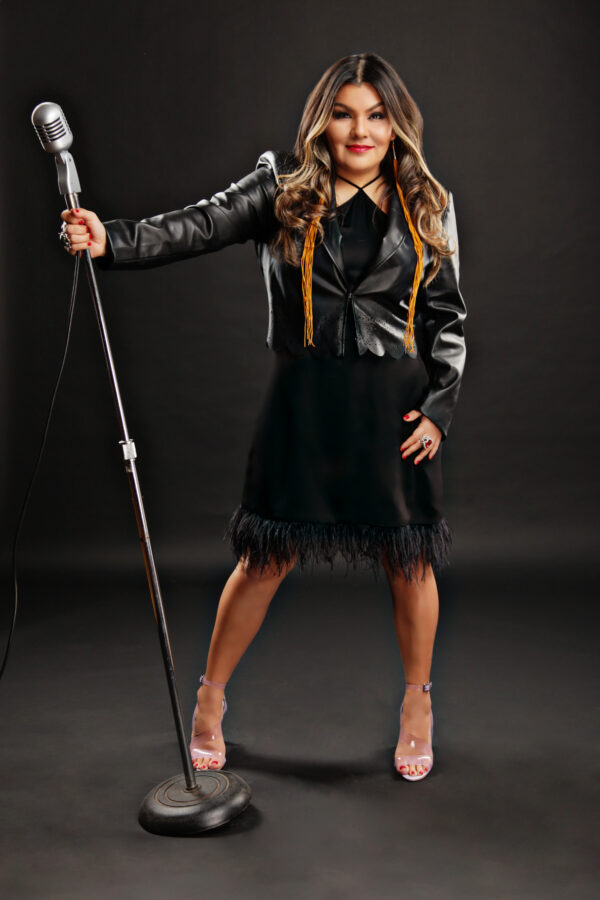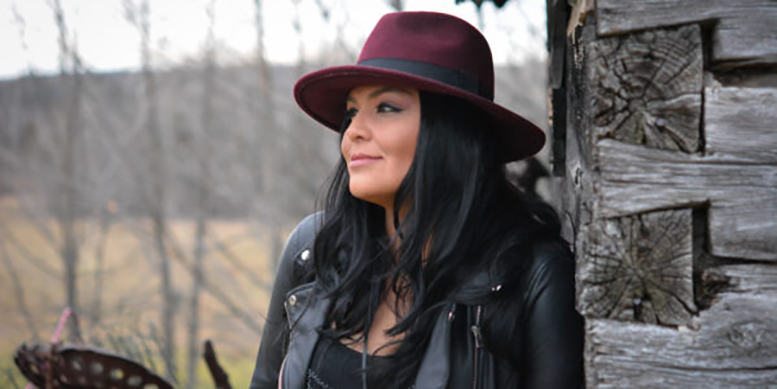By Kinnukana, Local Journalism Initiative Reporter

Crystal Shawanda. Photo supplied.
(ANNews) – JUNO Award-winning First Nations singer-songwriter Crystal Shawanda was one of the incredible performers at the Edmonton Folk Music Festival this weekend. She was featured at Stage 1 on Friday night and will be performing at a number of workshop stages over the next two days, including tomorrow morning at 11 am. On August 19 and 20, she’ll be performing at the Salmon Arm Roots and Blues Festival.
Crystal was born in Wiikwemkoong First Nation, on Manitoulin Island, in Northern Ontario. It is the largest freshwater island in the world and is surrounded by beautiful beaches. This unceded territory is composed of Ojibwe, Odawa and Potawatomi peoples. Together, these nations form the Three Fires Confederacy and are very progressive. Crystal shared that the community has many entrepreneurs, musicians, artists, and actors who have positively influenced her career as a professional singer.
Chrystal has two wonderful parents who taught her how to dream. “They were both dreamers,” she explained. “My dad was a closet singer and guitar picker. My mom was a teacher and she worked with special needs children. My dad was a truck driver. This all had an influence on me, I was always travelling with him in the truck, and it taught me that the world ain’t that big. You know, everywhere you want to go is down the road.”
Crystal is the baby of the family; she has two older brothers. Growing up, everyone in her family loved music. Crystal said that “it was cheap therapy, everyone leaned on music in their bad days and danced to it on their good days.”
Crystal started singing as soon as she could talk. She recalls jumping on stage when she was six years old at a school Christmas concert and hearing everybody laugh at a part in the song that she was singing. She said she could feel their happiness and she remembers thinking that she wanted to do this forever. She started getting paid to sing when she was ten years old, and she recorded her first album in Nashville when she was just thirteen years old.
Crystal had a defining moment in her career when she was seventeen, young and naïve. She went knocking on music producer’s doors in Nashville. She said she got lucky, and a famous music producer invited her into his office, and she had an opportunity to sing a few songs for him. He complimented her voice and said it was big and powerful, but he did not know what to do with her. He did not know how he would market her, and he told her that he didn’t know if country music fans would be ready for a Native American. She tried to be mature and not take his feedback too hard, but a couple of months later she moved back home to the reserve and wanted to give up.
Crystal said, “He did not give me constructive criticism. If I had a bad hairdo, I could get a haircut, but there was nothing I could do about the color of my skin. I kind of went on a whirlwind of what I refer to as trying to kill my dream. I started partying and just trying not to sing, but no matter what I did I would end up back in front of a microphone. People in my community would tell me to go back to Nashville to try again and I had a very loving family that nurtured me through it and helped me to get over the trauma of what I experienced.”
With all the encouragement, Crystal packed up her truck and went back to Nashville where she could return to singing. She surrounded herself with the ‘best of the best’ in the business. She went to school and started learning from them. She let them teach her everything they knew and applied it to herself. Crystal signed a U.S. record deal with RCA Records and achieved immediate success. Her single You Can Let Go reached No. 1 on the Canadian Country Album chart and No. 16 on the Billboard Top Country Albums. Crystal made history as she had the highest charting album by a Canadian Indigenous country artist.
A few years later, Crystal saw that country music was changing and was becoming more pop oriented. That was not what she grew up wanting to sing, so she left RCA Records and created her own label called New Sun Records. It started out as a need for her to figure out who she was as an artist. She needed to remember her own voice. Crystal released a few country albums under her own label I’ll Be Home For Christmas and Just Like You which won a JUNO in 2013 as Best Aboriginal Album. She then started recording music that she loved to sing and stuff she was going through. She made a switch to the blues with her album The Whole World’s Got The Blues.
A few years later, she also released Fish Out of Water and Voodoo Woman and Church House Blues. She won a JUNO In 2021 for Church House Blues as the Best Blues album. She was the first Indigenous artist to ever win a Juno in that category which gave her recognition as a bona fide blues talent. Crystal also became the CEO of the first Indigenous owned label to chart mainstream radio.
When asked what advice she would provide to other Indigenous people who want to pursue their passions, Crystal said, “I would say to build the life you want, if it makes you happy, then always remember that is the point of it. Sometimes the things that make us happy are not the easiest things. For example, me as a musician, it is ebb and flow – some days are great, and some days are hard. On those hard days, you just remember the good days and what you really love, and it will be enough. Just go for it! Just remember always do what makes you happy and be willing to learn, listen to other people and learn from others who do what you always wanted to do.”
Crystal is currently on tour in Canada and information on tour location/dates can be found on her website: Crystal Shawanda | Official.



Be the first to comment on "Singer-songwriter Crystal Shawanda successfully built the career she wanted"